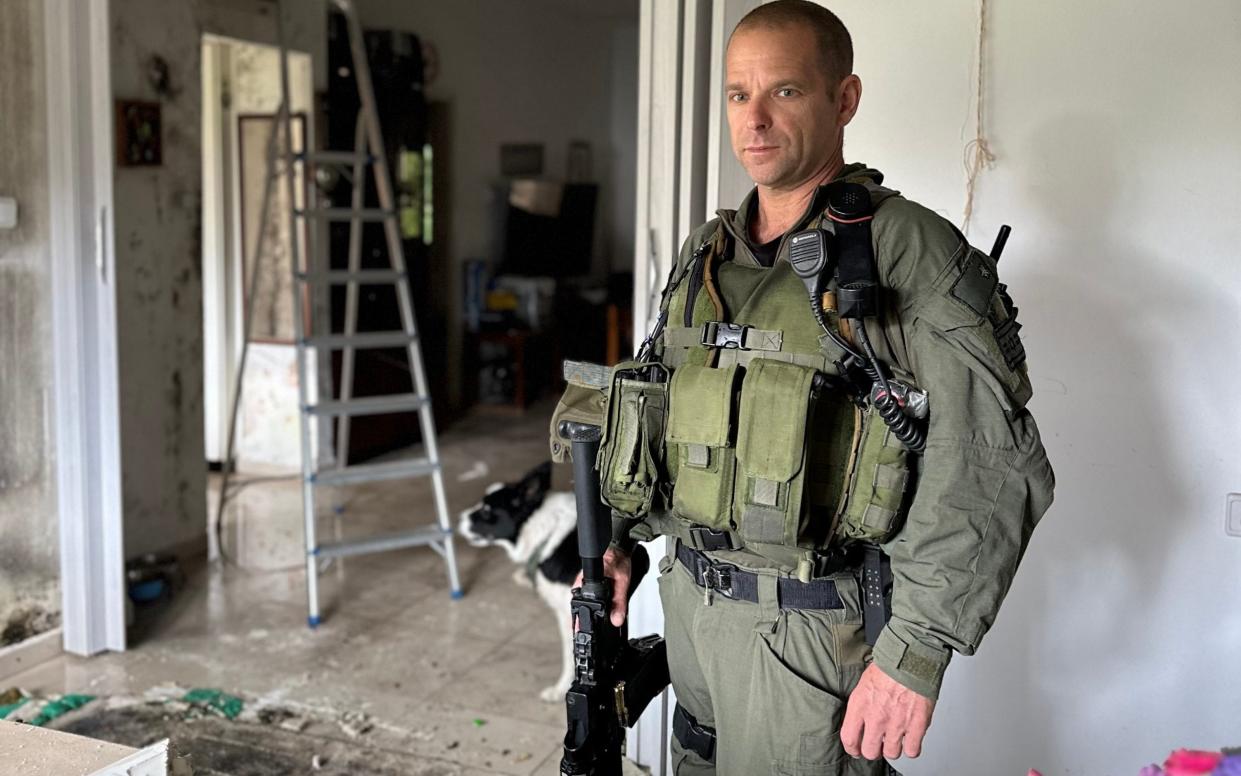In Israel’s deserted north, your nearest neighbour can be a Hezbollah fighter who wants to kill you

Uzi’s baby has just turned one, but he can count the few times he has seen her in the last year.
Instead of raising his daughter, the former factory worker has become a full-time soldier, tasked with protecting the now-deserted homes in his kibbutz from attack.
The 36-year-old lives on Kibbutz Hanita, just 50 metres from Hezbollah outposts, which has been transformed from a simple agricultural community on the border with Lebanon to a makeshift army base.
Amid the heaviest bombardment since the second Lebanon war, more than 3,000 projectiles have been fired by Hezbollah into Israel since October 7.
The beautiful tree-lined roads up the mountainside have been turned into muddy tracks by tanks, with soldiers now patrolling where children once played freely in the 750-strong community.
“I miss my children, my wife, the life we lived, the simplicity,” he said, his eldest of two just three years old. “I want to be part of raising my daughter but instead, I’m here, safeguarding what’s left of our community’s homes,” he said.
More than 100,000 Israelis have been displaced from the country’s northern border, fleeing daily barrages of Hezbollah fire. Last week, 100 rockets came from Lebanon in a single day.
Uzi cannot sleep in his own home, which is in direct range of Hezbollah.
He is one of several members of his community who have stepped up to guard their kibbutz despite the ongoing shelling.
“We sleep with one eye open, it’s not a normal life,” he said.
‘When it rains, we keep a finger on the trigger’
“Sleeping with hand grenades and rockets, it’s not the life any of us wants. When the rain comes, we have a finger on the trigger as we know that’s when they’d strike because we can’t see or hear anything.”
Located metres from the border, the community has been the hardest hit in the northern region. Scores of his neighbours are expected not to return, even after the Hezbollah attacks cease, citing fears the atrocities of October 7 could be repeated by Hezbollah in their kibbutz.
More than 1,200 people, mostly civilians, were killed by Hamas terrorists on the single most deadly day for Jews since the Holocaust and more than 130 of the 250 hostages taken that day remain in Gaza.
“It’s always coming back in my mind that October 7 could still be here – we were lucky it didn’t happen and now the hardest part will be to get the feeling of security here for us and to bring the families back,” Uzi said. “Our retired parents will come back in any condition as it’s their home, and they will die here, but for those with small children, the equation is very different.”
Aviv is also part of the volunteer team guarding the homes in his kibbutz. He was the local factory manager before the Hamas attacks, living a quiet life in the mountainside community where he was born and raised.
“Who is to say that three months after the families come back, October 7 won’t happen here,” he said. “You ask yourself, could the first response team have stopped an infiltration if it happened in the north?”
Devastated communities
The permanent departure of some young families from the quiet rural community would leave it devastated forever, said Aviv.
“If you have a few families leave the place it’s a huge effect,” he said.
He added that despite the conflict with Hezbollah along the northern border not officially being classified so, “there is a war here already”.
A senior Israeli Defense Forces (IDF) source said the situation remained volatile, explaining: “If it wasn’t for what’s happening in the south, what’s been happening here in the north would ordinarily be a cause for war but we are exhausting the options for a diplomatic solution.”
Aviv continued: “In the long term, if people don’t feel safe to leave their kids at home when they go to work, it’s a big question if they’ll ever be able to come back.
“The risk of terrorists emerging out of tunnels from Lebanon into the kibbutz fills the families with horror.”
According to Tal Beeri, a former IDF intelligence expert, Hezbollah’s sophisticated tunnel complexes run hundreds of kilometres, many big enough to fit trucks through.
Like Hamas in Gaza, the tunnels allow the terrorists to fight from underground with sophisticated drilling technology connecting multiple towns and villages in Lebanon. Funded by Iran and North Korea, the tunnel project began in the 1980s and makes Israel’s northern border deeply vulnerable.
Erez, 46, is separated from his wife and three daughters aged 14, 12 and six, who are now sharing a hotel room while the factory safety officer guards the family’s community.
His parents’ home where he grew up has been destroyed by a rocket which landed on the roof of the adjoining house. The family dining table around which many joyous celebrations once took place is now unrecognisable, the smell of damp overwhelming inside the house as the rains in the north pour into the home.
“The future of the kibbutz depends on the border with Lebanon,” he said. “Like this, nobody is coming back. The families with kids won’t come. We are just lucky that Hamas didn’t work with Hezbollah on October 7 as if that happened we wouldn’t be sitting here now. It’s a very scary thought.”


